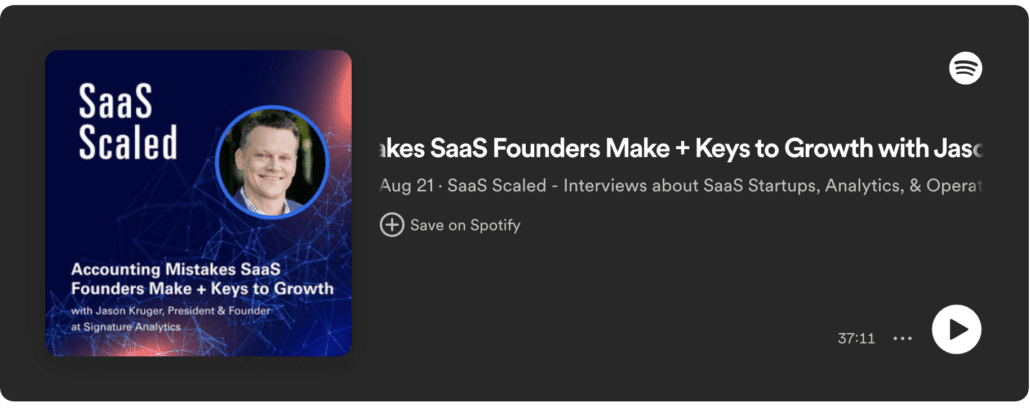Welcome to The Faces of Business, hosted by Damon Alka, where conversations revolve around life and business experiences. Our aim is to entertain, engage, build a community, and offer insights that help others achieve their business aspirations. Today, we’re honored to host Jason Krueger, a linchpin from Signature Analytics, known for his substantial contribution towards ensuring financial clarity in businesses.
Listen on iTunes: https://podcasts.apple.com/us/podcast/creating-financial-clarity-for-the-business-sale/id1558858992?i=1000622548395
Damon Alka:
We’re back on the Faces of Business, and I’m truly excited about today’s session. Jason Krueger, with his extensive experience at Signature Analytics, will give us a deeper understanding of financial clarity in business. Jason, it’s great to have you on board. You and your team at Signature Analytics have had a considerable run in this business providing outsourced accounting services. There must be some intriguing stories over the years. Tell us about some significant challenges you’ve faced.
Jason Krueger:
More often than not, we’re called in post-crisis. We’ve seen businesses facing issues like significant fraud. While it’s not always ideal, our primary focus remains on guiding businesses to understand their financials better. We want to help them in achieving their long-term objectives.
Damon Alka:
How did your journey start, and how did the idea of Signature Analytics come into being?
Jason Krueger:
I began my journey in public accounting during the late nineties, specifically on the financial statement audit side. I believed that understanding the numbers equated to understanding the business. My career began with Moss Adams, then transitioned to Deloitte for a larger SEC experience. However, my heart was always set on mid-market companies.
Over the years, I observed many businesses merely looking at accounting and finances as a necessary obligation. I recognized a void in the market; companies deserved better financial guidance. Many needed more resources or the right talent for their accounting needs. This realization inspired the birth of Signature Analytics in 2008. Our mission was clear: to assist small and mid-market businesses in navigating the world of finance, offering them clarity and peace of mind.
Challenges Mid-Market Businesses Face
Public accounting introduced me to a plethora of companies, differing not just in size, but also in the industries they thrived in and the leadership at their helms. It’s undeniable that larger, public companies are leagues ahead in terms of sophistication. They have a rigorous structure with all their policies documented meticulously, and a team comprising seasoned professionals who have grown up the corporate ladder.
On the flip side, the mid-market domain often comprises first-time entrepreneurs. They lack the resources to replicate the intricate corporate structure that their mammoth counterparts maintain. The initial realization of their shortcomings in financial and accounting expertise was a revelation, but now, it’s a common sight for me.
Often, I perceive this sector as the ‘wild west’ of business. Companies burst forth with innovative ideas, but there’s a glaring gap when it comes to the structural know-how of scaling up and monetizing these ideas. The talent deficit in the finance realm exacerbates this challenge. Fewer individuals are opting for accounting as a profession, which leaves a void in expertise, especially for these mid-sized businesses.
Honestly, I empathize with the youth’s perception of accounting. I didn’t delve into accounting with the intent to stick to it indefinitely. I was more intrigued by the intricacies of business it would reveal.
While public companies have a mandate to maintain their credibility through reliable projections, these burgeoning businesses are often left to navigate their trajectory without much guidance. Today’s business landscape, especially with entities like SaaS companies, is rapidly evolving. They might land substantial funding and hit the market running within a couple of years. It’s an unpredictable, fast-paced environment.
We’ve witnessed numerous companies that, upon securing capital, are immediately subjected to leadership changes influenced by their investors. They might bring aboard a proficient CFO, but the support structure beneath is often underwhelming, sometimes just limited to a low-tier bookkeeper. However, these scenarios are gratifying for us. These businesses have a defined vision. They value our expertise, allowing us to assist in fleshing out their operational backends, and propelling their growth trajectory.
Smaller businesses often overlook the monumental benefits they can harness from financial data. Efficiently leveraged financial insights can be transformative, ensuring swift, informed decisions.
Cash is King – Especially in Manufacturing & Distribution
In the contemporary business landscape, particularly in our current climate, one axiom remains timeless: Cash is king. Healthy cash flow often masks underlying issues, but once there’s a hiccup in that flow, deeper problems surface, often catching business owners off-guard.
I’ve interacted with countless manufacturers, and it’s a common conundrum. They’ll present their income statement, their P&L, flaunting the profits, and then juxtapose it with their liquidity woes. “Why do I have no cash?” they’d ask. It usually boils down to two reasons. Firstly, the financial statements might have discrepancies. Secondly, and more often than not, the ‘missing’ cash is tied up in inventory. It’s on the shelves of their warehouse, waiting to be transformed into sales.
The intricate dance of managing inventory processes, aligning it with sales cycles, and ensuring optimal purchase patterns often trip manufacturers up. Their industry probably faces the most challenges in cash management, making it paramount for them to cultivate robust banking relationships. Fortunately, the inventory can serve as collateral, providing a bit of financial cushion.
For businesses seeking growth and expansion, there comes a moment of reckoning. Whether it’s for financing, attracting investors, or capitalizing on potential tax credits, they’ll need to present their financials to third parties. This is a litmus test of sorts. If their financial statements are not coherent or if they appear unreliable, it stalls their ambitions. That’s when they realize the importance of having sound, comprehensible, and accurate financial documentation.
Know Your Margins
Margin is the heartbeat of any business, driving profits and illuminating key financial health indicators. Surprisingly, many business owners have a somewhat vague grasp of their margins. When questioned, they might provide a broad range: “Oh, it’s somewhere between 50 and 60%”. Such vagueness can be dangerous. Businesses should know their margins to the exact percentage point. Further, this should be broken down by product and service line. Identifying which products or services are most profitable allows businesses to fine-tune pricing and cost structures. For a business with a turnover of $10 million, a margin improvement of just 1% translates to an extra $100,000 in profit. Accurate visibility into margins can drive impactful, immediate decisions.
Why Liquidating Inventory is Smart in Cash-Strapped Times
Growing businesses often find themselves cash-strapped, and more often than not, the culprit is inventory. Businesses might see impressive growth rates, but if their inventory growth outpaces revenue growth, liquidity issues arise. Inventory sitting on shelves not only ties up cash but can also incur interest if financed through a line of credit.
In recent years, supply chain disruptions have forced many businesses to stock up, leading to inflated inventory levels. Now, businesses have an opportunity. They can liquidate this excess stock, converting products into much-needed cash. Even if this means selling products at a reduced price, the infusion of liquidity can support other business needs, making it a strategic move.
How Accounting Technologies Have Improved Accounting Practices
The accounting landscape has been dramatically reshaped by technology. With the rise of electronic transactions, processes that once depended on paper checks or wire transfers are now faster and more efficient. While sophisticated solutions like ERP systems can be costly and daunting for small and mid-sized businesses, there are intermediate options, like QuickBooks, that serve many needs.
However, the key lies in proper implementation. If systems are incorrectly set up, teams might revert to manual practices like maintaining Excel spreadsheets on the side, leading to inefficiencies. Ideally, businesses should move away from practices like cutting paper checks, with platforms like bill.com offering automated solutions. The potency of these systems is undeniable, but they must be correctly tailored to each business’s unique needs. One of our primary focuses when onboarding clients is assessing their accounting environment, ensuring their systems and technology align seamlessly with their operations.
When diving into the methodology of SA’s assessment, it becomes evident that the approach is all-encompassing. Their focus is not just on one dimension, but a holistic evaluation spanning people, processes, technology, and reporting structures. Within this vast landscape, technology holds a significant role. The assessment involves mapping out the present technological tools, understanding their applications, pinpointing their strengths and weaknesses, and discerning their integration capabilities. As the assessment unfolds, SA crafts recommendations. Interestingly, these suggestions aren’t rigid; they are thoughtfully adjusted based on a company’s financial health. If resources were unlimited, certain solutions might be ideal, but SA acknowledges the real-world constraints businesses face. Thus, they offer a balanced blend of quick efficiency boosts and long-term strategic plans. Emphasizing their tailored approach, SA firmly believes that each client requires a unique solution. This philosophy stands as a testament against a one-size-fits-all mindset. With SA, the journey goes beyond just “doing accounting”. It’s about crafting a plan, understanding the ecosystem, and then executing. A notable analogy draws attention to the roles of accounting and IT in businesses. Often, they’re like black holes – their intricacies remain mysterious until something goes awry.
The Importance of AR/AP Processes
The financial arteries of a business, Accounts Receivable (AR) and Accounts Payable (AP), have long held prominence in operational discussions. One of the primary tools to enhance cash flow, as discussed, is refining payment terms. It can be as straightforward as soliciting larger initial deposits, or perhaps invoicing with increased frequency. Many business owners, tethered to traditional beliefs, might be apprehensive. There’s a prevailing thought that customers might balk at these new terms. But as SA’s journey suggests, testing these waters, especially with new clientele, might yield favorable currents. The narrative evolves as we trace SA’s 15-year trajectory. The company transitioned from a 30-day term, predominantly check-driven model, to a more fluid system, and the positive impact on cash flow was palpable. This financial evolution underscores the need for consistency in AR and AP processes. From invoicing to collections and from strategizing payments to executing them, a regular rhythm is pivotal. And when discussing manufacturing businesses, the challenges amplify. These entities grapple with a unique financial puzzle – navigating the hiatus between procuring materials and securing customer payments.
Why a Good Banking Relationship is Crucial
Within the financial tapestry of a business, banking relationships emerge as crucial threads. Regardless of an immediate necessity, forging a sturdy partnership with a bank is indispensable for any business. This relationship is not just about transactional exchanges. It’s a strategic alliance that, even in higher interest periods, can offer growth avenues. The message is clear: nurturing a robust banking relationship is not a mere luxury but an essential strategy for business vitality.
Budgeting Best Practices
When it comes to financial reporting, budgeting is paramount. Unfortunately, some businesses treat budgeting as a box-checking exercise, creating one and then relegating it to a drawer, never to be revisited. A budget, when utilized properly, sets clear expectations. It’s an instrumental tool in gauging how your business is performing compared to what you anticipated. By dissecting the budget into its various components—revenue, cost of goods sold, margin, and other costs—one can gain a granular insight into the business’s health. It’s not about mere number crunching; it’s about understanding your business’s trends over time. And while a storm brews in the market, with rising interest rates and looming recession threats, it’s time for businesses to consider “weatherproofing.” This doesn’t equate to slashing budgets haphazardly. It’s about strategic preparation. Some sectors might necessitate investment to gain market share, while others present genuine opportunities for financial trimming. The current market landscape is a mixed bag: while some businesses are witnessing phenomenal growth, others are grappling with challenges. A lot hinges on the industry and its unique dynamics.
The Importance of Monthly Close
Consistency in financial reporting is non-negotiable for businesses. The ideal structure emphasizes a regular monthly close process, ensuring timely availability of financial packages. Companies lagging behind in their reporting find themselves grappling with outdated or irrelevant data. Take, for instance, Signature Analytics; the emphasis is on maintaining a consistent monthly reporting package. This comprehensive package delves deep, starting with the income statement, moving on to the balance sheet, and then addressing cash flows. But the analysis doesn’t stop there. To truly understand a business, it’s crucial to dissect revenue, break it down by product line, assess the cost of goods sold, margins, and other expenses. Furthermore, it’s essential to discern trends and understand their implications. But monthly reports aren’t enough. With the delay inherent in monthly reporting, businesses could be operating nearly two months behind the latest data. That’s where daily reports come into play. Real-time reporting tools like Microsoft Power BI are invaluable, providing daily insights and snapshots to help businesses stay on top of their game. This proactive approach is essential. Whether you’re a service-based business monitoring employee utilization or a high-volume retail outfit tracking monthly sales trends, you need to ensure you’re on track to meet your forecasts. Being reactive can spell disaster. If you’re behind on your targets, recognizing this early can mean the difference between a minor course correction and a major catastrophe. It’s crucial to understand the correlation between daily operations and the eventual impact on cash flow, especially in businesses with longer cash cycles.
Accrual Accounting Matters
Accrual accounting is pivotal for any business seeking clarity in their financial reporting. While the subject might seem a bit technical and perhaps tedious to some, its essence is quite straightforward. Accrual accounting ensures that the revenue generated in a given month aligns with the costs incurred for the products or services during that period. This gives businesses a realistic snapshot of their profitability and helps them gauge trends. For instance, if you rely solely on cash basis accounting, you might record revenue whenever a sale is made or an invoice is dispatched and log costs when a product is purchased. This approach could paint a misleading picture. You might have borne costs three months prior, and by not syncing those costs with relevant revenues, your books might show you’re performing exceptionally well when, in reality, you could be on the cusp of a downturn. Transitioning to accrual-based accounting isn’t just a recommendation; it’s a necessity for businesses wanting a crystal-clear view of their financial health.
Preventing Fraud
The danger of having one person wear too many hats in the accounting department cannot be stressed enough. Many small businesses, driven by budget constraints, often allow a single individual to manage invoicing, bill payments, and payroll. Such a lack of segregation of duties is risky, making it easy for malpractices to slip through. A stark example of this can be found in a manufacturing setting where an individual with overarching control over accounting and payroll led the business astray. The owner’s disregard for accounting turned the inventory into an enigma, allowing the individual to manipulate the inventory balance and consequently the profitability figures. This person’s fraudulent activities stretched from claiming inflated expense reimbursements to setting up fake suppliers. While most fraudsters eventually get caught, the destruction left in their wake can be monumental. Even businesses with straightforward cash operations aren’t immune to fraud. The narrative underscores the significance of incorporating external oversight and robust internal controls, even if it means involving the CEO or executive team in the financial review processes.
The Future of Accounting (Technology)
At Signature Analytics, technology isn’t just incorporated—it’s embraced. The future of accounting is exciting, with innovations poised to streamline many traditional processes. The more we can automate and optimize aspects like reconciliations and data entry, the more bandwidth we have for value-added tasks. The introduction of AI, exemplified by tools like ChatGPT, has revolutionized how we visualize accounting. It’s not just about traditional financial statements anymore. Trend analyses, process documentation, and various efficiencies are within reach thanks to technological advancements. By leveraging a custom reporting tool compatible with software like QuickBooks and NetSuite, Signature Analytics ensures its clients receive comprehensive financial statements regularly. The goal is to perpetually augment value and efficiencies, even in sectors of accounting that might seem commoditized.
How to Get in Touch With SA
For those keen on delving deeper into what Signature Analytics offers or just to discuss business challenges and experiences, reaching out is easy. The best avenue is through their website, signatureanalytics.com. For more direct communication, interested individuals can email [email protected] or call (858) 228-5643. With a dedicated team of 85 professionals, Signature Analytics aims to bolster the small to midsize business sector. The philosophy is clear: if they can’t assist, they won’t force a solution. The essence is to share, guide, and collaborate with business owners nationwide.




